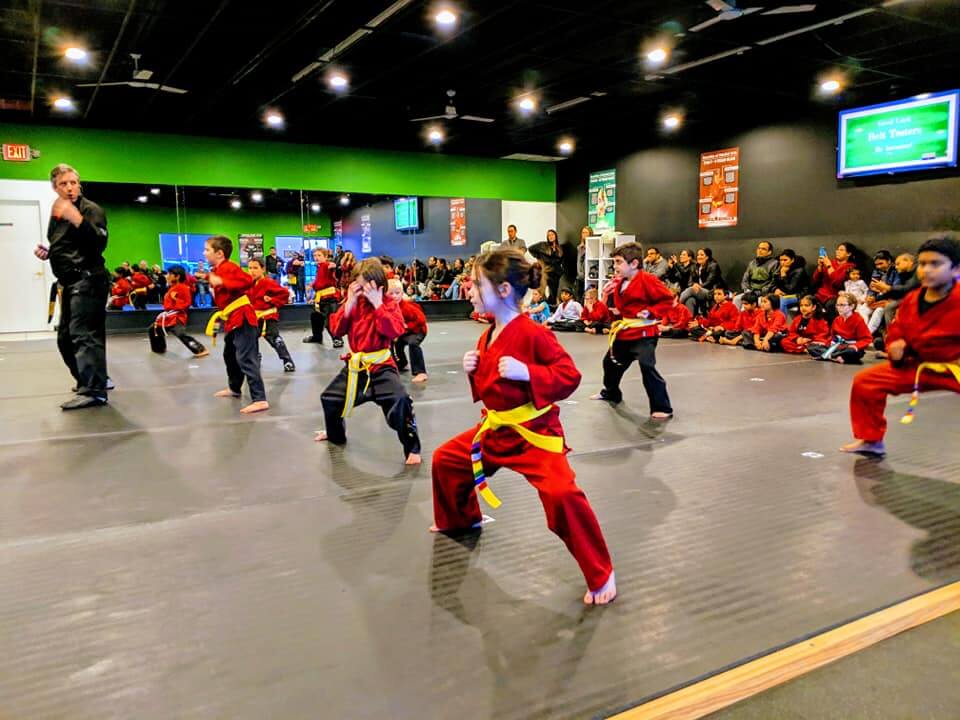Children have leadership training opportunities built into martial arts classes. Progressing in martial arts builds confidence, resilience, and self-discipline. Practice requires goal setting, time management, and adaptability. These skills are important for becoming a strong leader.
Are you trying to find the best way to help your child build confidence or become a leader? Are you also trying to find ways to help your child embrace an active lifestyle? Keep reading to find out how martial arts can do both at the same time.
At Prestige Martial Arts in Troy, we know that time is precious and activities need to cultivate the whole child to be effective. In this blog post, we’ll explain how martial arts complete those goals for your family.
Leadership Skills Learned in Martial Arts Training
Leadership skills learned in martial arts training are cultivated in the context of skill-building, practice, and classes. Children gain skills like self-discipline, communication, and compassion through the same activities that develop skills in martial arts.
Here is a list of skills that children can gain and develop in martial arts classes:
- Confidence
- Perseverance
- Resilience
- Communication Skills
- Home Exercise Habits
- Goal Setting
- Time Management
- Self-Discipline
- Compassion and Empathy
- Adaptability
- Parent-Child Bonding
Let’s take a closer look at how martial arts classes develop these characteristics.
Confidence Gained through Martial Arts
Attending martial arts classes, sparring, and participating in tournaments requires confidence. When a child gains confidence in one area of their life, they can apply that confidence to other areas. Confidence is an essential skill for leaders and success in life.
Children and teens benefit from learning confidence in martial arts classes.
Building Perseverance through Martial Arts
Martial arts requires perseverance to develop skills. Forms and techniques gradually become more complicated and require time and dedication. Advancing from one belt to the next in Karate also requires a time commitment that develops a child’s perseverance.
The perseverance that children and teens gain in martial arts classes will contribute to leadership development.
Developing Resilience through Martial Arts
Children will experience difficulties in martial arts, but that’s good for developing resilience. Leaders need to know how to pick themselves up after mistakes or failures and try again. That’s precisely what martial arts classes can teach your child to do.
Resilience is an essential skill for children and teens, and martial arts classes are one of the best ways to help them develop resilience.
Communication: Martial Arts and Public Speaking

The skills and confidence gained in martial arts classes lay the groundwork for children to become better at public speaking. Students of martial arts must learn nonverbal communication cues in sparring, and that awareness enhances communication skills across the board.
Not only that, but martial arts is a fun way for children and teens to develop communication skills!
Incorporating Home Exercise Habits and Routines
Martial arts students learn to incorporate home exercise habits and routines to master skills. Martial arts can be an alternative to team sports to encourage lifelong healthy habits and care for the body.
Children may choose to participate in more physical activities and sports after getting confidence from martial arts!
Learning Goal Setting in Martial Arts
Martial arts and earning belts are cemented in goal setting. Students must learn specified skills to advance to some belts. Other belts require a time commitment to studying and improving those skills. Children who advance in martial arts will inherently learn to set goals and achieve them.
Time Management Skill Development through Martial Arts
Children’s activities like martial arts require the child to balance the commitment to martial arts, school, family time, and other obligations. This time management helps children learn to balance work and life, which is vital for leadership development.
Find out more ways that martial arts instruction contributes to time management skills here.
Self-Discipline and Martial Arts Training
Martial arts training requires self-control and self-discipline. Children will learn the facets of self-discipline and self-control, such as impulse control, emotional regulation, and dedication. All of these aspects will help your child or teen become a better leader.
Martial Arts Cultivate Compassion and Empathy
Martial arts cultivate compassion and empathy through sparring and tournaments. Children learn how to win and lose gracefully, which allows them to put themselves in their opponents’ shoes. Martial arts encourage mindfulness, which can lead to empathy and compassion throughout the child’s life.
Adaptability Learned through Martial Arts
Learning to spar in martial arts classes requires learning adaptability at the same time. Sparring isn’t just about physical adaptability either, but also emotional adaptability. The skills learned in sparring open the door for adaptability in other areas of the child’s life.
There are many more ways that martial arts can teach children and teens adaptability.
Parent-Child Bonding and Martial Arts
Engaging with your child’s martial arts training is an opportunity for parent-child bonding. Ask your child what they’re learning. Ask about observing a class. Attend tournaments. Parents can even find a martial arts class for adults and learn skills with their children!
Get more tips on using martial arts to enhance parent-child bonding.
Comprehensive Martial Arts Benefits
The physical, mental, and emotional benefits of martial arts are comprehensive. The skills and characteristics developed in martial arts classes will influence all aspects of the child or teen’s life. Leadership ability is the culmination of these benefits gained in martial arts classes.
Discover more about the integrated and comprehensive benefits of martial arts classes.
Conclusion: Finding Martial Arts Classes in Michigan
Prestige Martial Arts offers classes to children and teens living in Troy, Michigan, and the surrounding communities. You can contact us online for more information about classes or scheduling or call (248)-687-8641.
Frequently Asked Questions
How does Karate teach leadership skills?
Karate teaches leadership skills by reinforcing habits like self-discipline, goal-setting, and perseverance. Progress in martial arts requires dedication and skill building. Children also become more confident through karate classes, which is another essential leadership skill.
Would Karate teach my child self-discipline?
Karate teaches children self-discipline and self-control. These skills are required in order to progress in martial arts. Self-control includes both emotional regulation and body impulse control. With time and commitment to martial arts, children develop self-control habits and self-discipline.
Do martial arts make you tougher?
Martial arts can make you tougher in the sense that you build muscle and endurance during practice. Martial arts like Karate, Taekwondo, or Shaolin Kung Fu require time and dedication to practice, which creates physical strength and perseverance.

